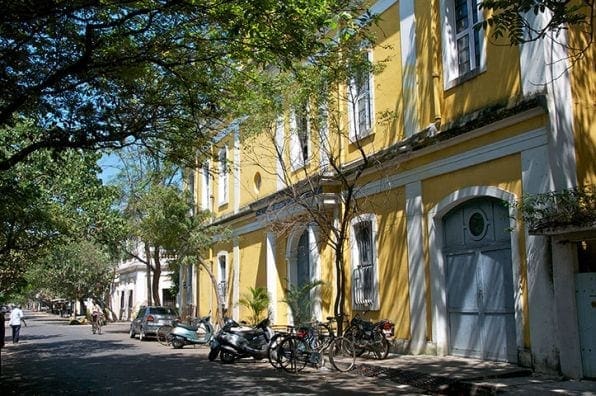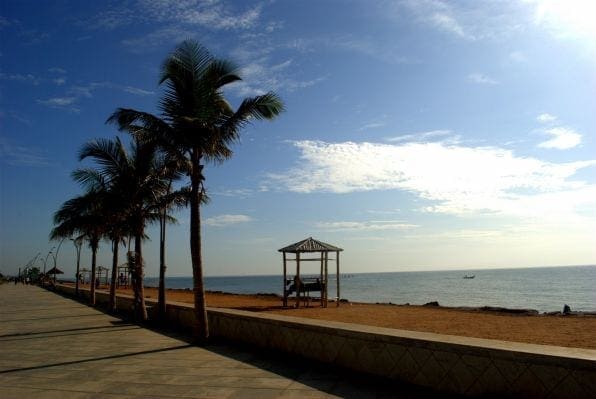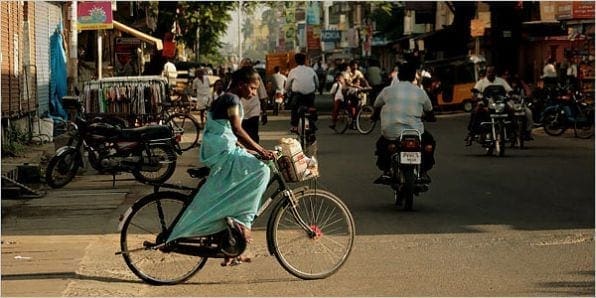
Down south from Bangalore, it’s an over-night drive to Pondicherry, the french city of India. Pondy was a french colony for about 350 years, till the early 1950s.
The city is about 4 km in radius, and has a beach walk. Not a beach. No sand. No entering the water. No chasing the tiny crabs, unlike Goa. Instead, the beach walk is made by reclaiming the beach land with rocks and boulders– A la Bombay’s Marine Drive. In fact, the film Guru’s Marine Drive scene, where Abhishek Bachchan meets Mithun Chakraborty, while Mithu Da is walking his dog, is shot on the same reclaimed beach.
One can’t help but draw parallels between Pondy and Goa. Both destinations are similar in many ways, but what differentiates the two cities/states is the attitude of localities towards the tourists. As a tourist in Pondy, you get a feeling that localities are not ready to share their beautiful little city with anyone else. In Goa, the localities have grown past such possessive feelings.
If Pondy weren’t an Union Territory, it would have been in the state of Tamil Nadu. Pondy’s local language is Tamil. And in Tamil Nadu, Tamil is God.

Now the Good Parts:
Broad Spectrum of Eateries: From the french-villa-converted-into-french-garden-restaurants to table-and-bench south-Indian mess, from AC beach restaurants that serve south-Indianized north-India food to bakeries that serve right up to to fried rice, schezwan style. Pondy has it all. It is a food lover’s heaven. And each restaurant is better than the other. A satisfied customer once told a chef that good food is good ingredients cooked cell. That customer must have had stayed in Pondy.
The french restaurants are all up market, not surprisingly, and are based in the french colony–which is along the beach walk. They are usually run by people of french descent. (And them french people have rather funky hairdo). The food is delicate, appropriately portioned, and served with a smile. Beer for breakfast, whiskey for lunch, and a variety of frangipani for dinner is not uncommon in these places.
Amazing Architecture: But that’s not all it. Food is just a small part of the experience. It’s the buildings, the gardens, the bold use of basic colors for furniture and for buildings and public structures, the understanding of music the french restaurant owners have, the limited, highly exotic menu, the wine list, the selection of whiskeys, All of these aspects are like various elements of a beautiful painting–like the colors, the strokes, the textures, the shades, the depth–which on their own may be captivating, but when they are brought together in the right proportions, make an impression. The collective beauty extending beyond its parts always finds a place in the nostalgic cupboard.

I bumped into a Gujju, Mr. Joshee, and he told me, “Every building in the french colony speaks to you.” It was too early in the day for me to gain the ability to hear the walls speak. However,the layout of the colony, the architecture of the buildings is nothing short of what one can see in old french movies. The walls are yellow, pillars white, window canopies white, windows big, its panes polished teak, the big, thin doors teak, the window bars bent slender, not more than required, and in places where necessary. On either sides, roads are lined with branched-out trees; bricked roads are interspersed with bright, white sunlight and the shadows of branches, copying the yellow and white patterns of the buildings, mingling, dancing. The humid sea breeze teases the neutral, matt finished walls, tells it that the catch was good today, the dusky red sky agrees. People walk. People use bicycles. Grown, saree-clad women use bicycles, leaving a trail of fragrance from the jasmine buds that strung from their plaited hair. The whole set up smells good.
The city side is more Indian, south-Indian, or rather, more like a south-Indian movie. People live like they are in a typical, over-the-top, civility and logic-defying south-Indian movie. Their ring-tones, their gait, the way they communicate with one another or with tourist (or lack thereof if you don´t happen to speak Tamil), even the way they lift their lungies all the way from their feet to wipe their faces, it’s like they are proudly playing an active part in a gaudy, Rajni movie. BTW that lungi lifting stunt can put the most courageous of Rakhi Sawants to shame. But that’s the male population; Women are human, refined, decent, humble, well-groomed. Beautiful. If you want to understand both the importance of Women in the world and the respect they command in our day-to-day lives, just go to Pondicherry and imagine the world without women. With their evolved and civilized behavior, the women of Pondicherry restore the balance of the society, the world, I guess.

Pondy is two worlds: the erstwhile french and the developing Indian; two distinctly opposite worlds coexisting in peace in a small area. And that’s the best part of the city.
The local, south-Indian food is magical. The Chettinad Cuisine is God sent. And it’s not for the faint hearted. Every morsel packs a punch. From the first bite, flavors just explode in your mouth. Unlike the delicate french cuisine, there are no degrees of flavors, no room for subtlety, no underlying aromas, no sequence in which the ingredients unfurl themselves as you proceed with a dish. When it comes to Chettinad food, everything is at full-throttle. And it’s not easy to play all high notes at one time and still make music. Chettinad cuisine is heavy metal of food.
Five minutes into your meal, you are gasping for breath, you are sucking in air though your mouth hoping that the air, though momentarily, might reduce the abrasion your senses have gone through, but in vain, just like you guzzling down liters of water. Curry leaves, black pepper, chillies, coconut, cinnamon, cloves, cardamom, more curry leaves, more black pepper, more chillies, and more coconut. Sweat starts dripping down your back, but you can’t stop eating for the flavors are hitting the proverbial spot, rather punching it, burning it, branding it with its hotness. Sweat starts dripping down your skull. The AC is rendered useless. Nose requires constant wiping. Eyes glisten. Tube-lights bear a blurry oval halo around them. Heart beats like a voodoo drum. At the end of the meal you feel cleansed, renewed, re-born, restored.
It was sunset and it was time to say good-bye to Pondy. My wife and I made one last trip to the beach walk, on the day-rented Activa from Mr. Joshee. The sky was picturesque with still, stretched-out clouds. The horizon was pink. Pondy’s Sea is kind: it doesn’t swallow the Sun. It just steals it from the world when no one’s looking.
About the Author: Dhaval Kolhapure is an alumni of the Welcomgroup Graduate School of Hotel Administration. He Blogs at Nomadic Peeps.

Be the first to comment